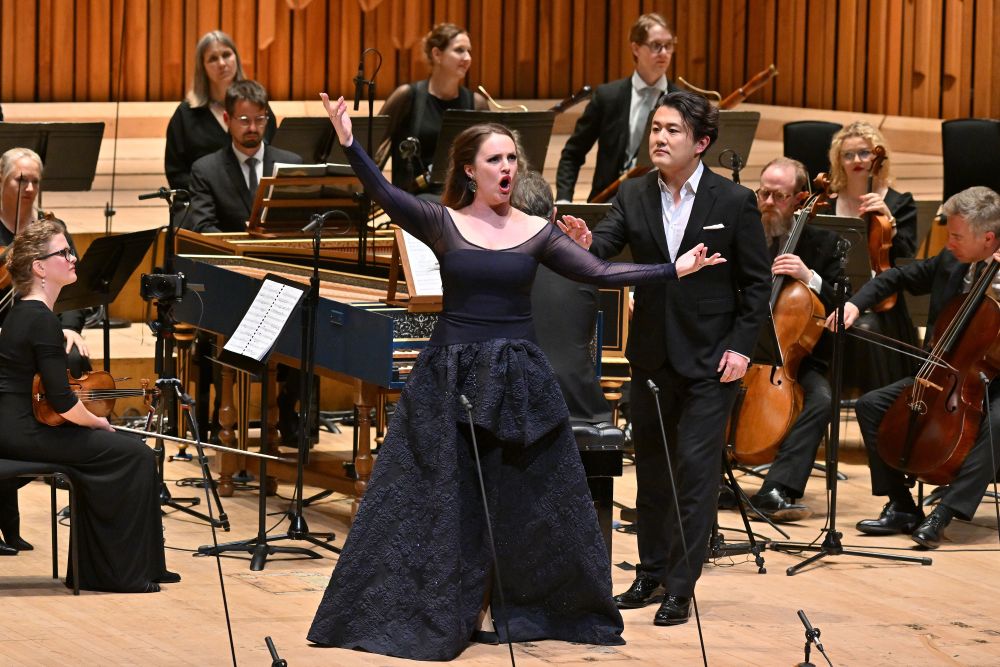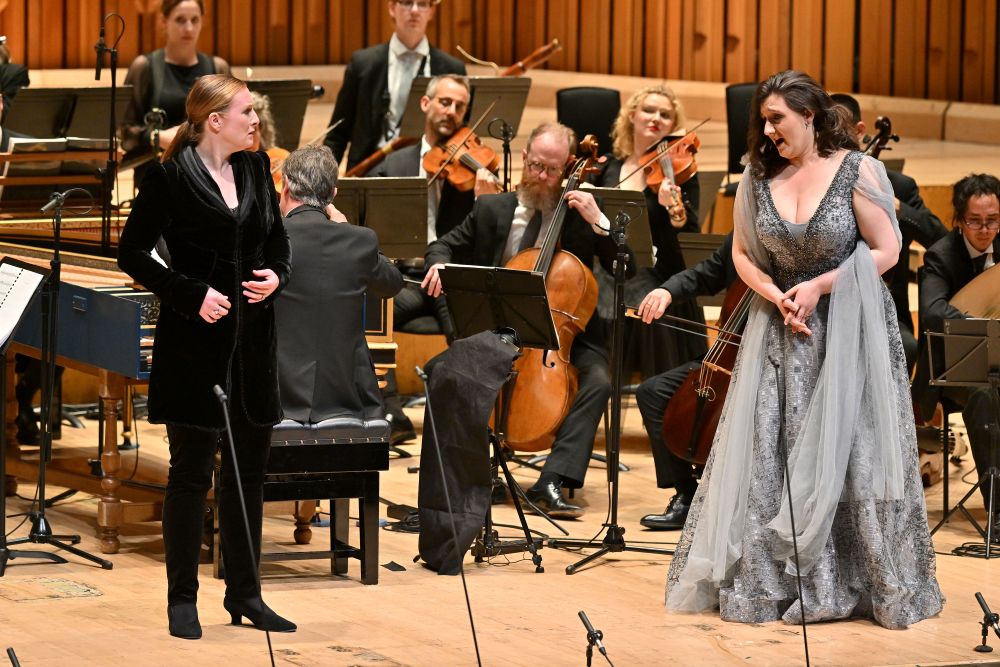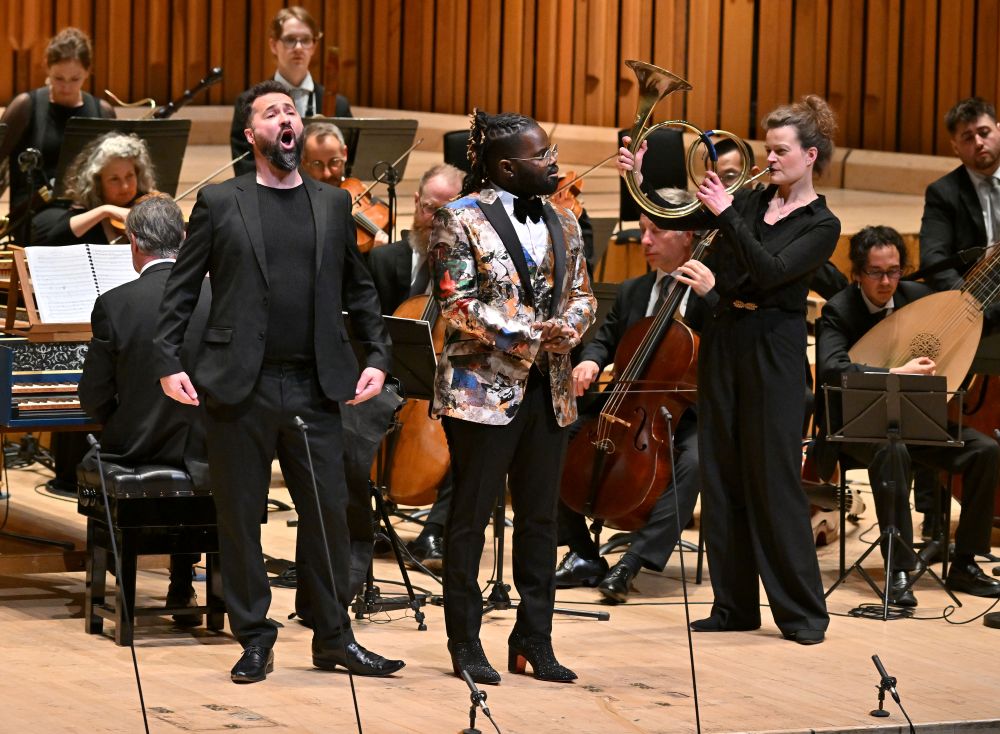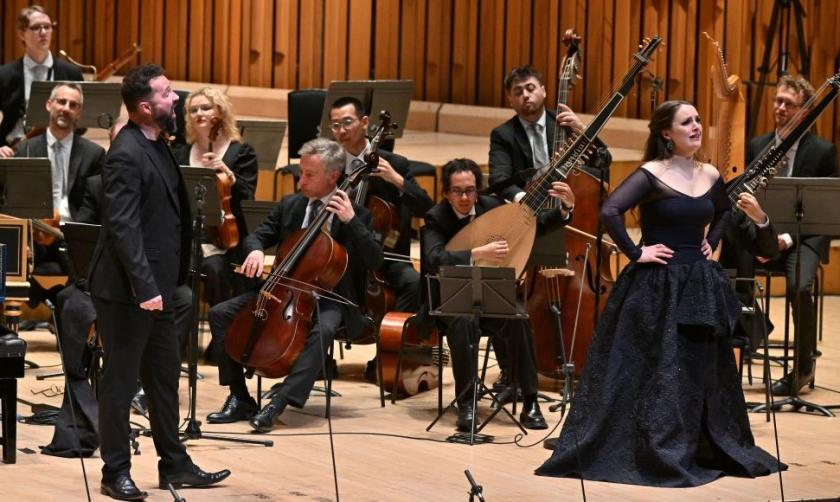Is Giulio Cesare in Egitto, to give the full title, Handel’s best and shapeliest opera? Glyndebourne’s revival of the legendary David McVicar production last year made it seem so, not least thanks to the presence of two of last night’s soloists, Louise Alder as Cleopatra and Beth Taylor as Cornelia. Highlight of 2022 was the English Concert’s more sparely presented Serse. This concert Cesare from that stable lived up to both standards.
Star billing in the Barbican’s publicity was national treasure Alder (pictured below with Meili Li), and not unreasonably so: Cleopatra’s pearl necklace of arias, from the frivolous to the plangent, runs the gamut of operatic variety, and Alder delivered at every point. The skipping gamester of her first appearance gave way to perfect poise, and heartrending da capos – the “back to the main sequence” third part of most Handel arias, sometimes too much, last night welcome at every point – in the turn to potential tragedy, "Se pietà" and “Piangerò”, and then the crowning glory, "Da tempeste", with glowing ornamentations worthy of the late Joan Sutherland.  If everyone loves Alder because she so owns the auditorium, and seems to address you directly, that quality of ease in front of the orchestra was shared by everyone else on stage. And stage it was, since although no director was named, all the suffering, tergiversations and lustful or loving clinches had their acted-out correspondence to the singing (not sure about Tolomeo’s head in a Waitrose bag, since we should get shock and not giggles from the off, but that was the only questionable note).
If everyone loves Alder because she so owns the auditorium, and seems to address you directly, that quality of ease in front of the orchestra was shared by everyone else on stage. And stage it was, since although no director was named, all the suffering, tergiversations and lustful or loving clinches had their acted-out correspondence to the singing (not sure about Tolomeo’s head in a Waitrose bag, since we should get shock and not giggles from the off, but that was the only questionable note).
Handel normally takes an act to truly warm the audience up, but we're in at the deep end here with the instant sufferings of Tolomeo's widow Cornelia and her son Sesto. Further examples of handsome presence came from Taylor, somehow making more of an impact than she had at Glyndebourne with perfect modulation of her big mezzo voice-in-a-million, lightening up for the happy aria towards the end, with string lines simply delicious, and the always simpatico/a Paula Murrihy (pictured below with Taylor), whose special gift is to blend with her orchestral colleagues and respond directly to them. Her "Caro speme" was another highlight of the evening, and the mother-son duet - taken very slowly by Harry Bicket, directing from the harpsichord, with justifiable indulgence in his singers' artistry - went deep at the end of Act One, as it should.  At first I worried that we hadn't got the return of sublime Emily d'Angelo, the Serse in the English Concert performance in which Murrihy also took part, as another mutable ruler. But countertenor Christophe Dumaux won his laurels first with natural, charismatic authority and then in some delectable dialogues in the two arias with instumental obbligati.
At first I worried that we hadn't got the return of sublime Emily d'Angelo, the Serse in the English Concert performance in which Murrihy also took part, as another mutable ruler. But countertenor Christophe Dumaux won his laurels first with natural, charismatic authority and then in some delectable dialogues in the two arias with instumental obbligati.
Ursula Paludan Monberg (pictured below on the right with Dumaux and John Holiday, Bicket behind them) temporarily stepped in to the consort role as his horn-playing double in "Va tacito e nascosto", bringing the house down. Nice to see her sitting behind us in her act off; and leader Nadja Zwiener flourished as nightingale for "Se in fiorito", Dumaux turning from trumpeter to songbird in exqusite accord. His biggest triumph was in the artistic swell-and-retreat on a single note with which Handel takes us by surprise as "Aure, deh, per pieta" by the water's edge in Act Three.  The other countertenors did as well as they possibly could: John Holiday camping it up as Tolomeo (love the jacket and the heels), Meili Li, proven lead in Irish National Opera's Vivaldi L'Olimpiade, reacting perfectly in recit to Alder. Morgan Pearse had the testosteronal baritone role of Achilla off to perfection - Bicket ensured that the eerie double-stopping cello accompaniment from Joseph Crouch made his death scene very spooky - and another baritone, Thomas Chenhall, made what he could of imperial sidekick Curio. The ensemble sang the choruses; the orchestra under Bicket's sensitive flexibility wrought constant wonders and engaged with the action when they weren't playing. You knew they were all having a good time, and so did we, as four hours simply flew by.
The other countertenors did as well as they possibly could: John Holiday camping it up as Tolomeo (love the jacket and the heels), Meili Li, proven lead in Irish National Opera's Vivaldi L'Olimpiade, reacting perfectly in recit to Alder. Morgan Pearse had the testosteronal baritone role of Achilla off to perfection - Bicket ensured that the eerie double-stopping cello accompaniment from Joseph Crouch made his death scene very spooky - and another baritone, Thomas Chenhall, made what he could of imperial sidekick Curio. The ensemble sang the choruses; the orchestra under Bicket's sensitive flexibility wrought constant wonders and engaged with the action when they weren't playing. You knew they were all having a good time, and so did we, as four hours simply flew by.















Add comment